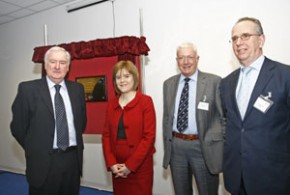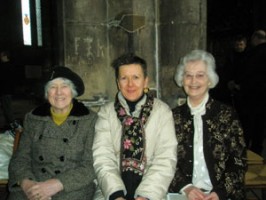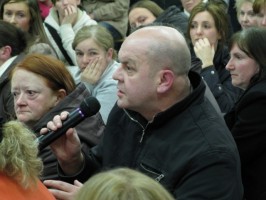Hope for Fairfield Farmhouse development
February 18, 2009 by localnews
Filed under Uncategorized
Plans for development of a forgotten corner of Elder Park are moving forward with the formation of a working group of key players.
Linthouse Housing Association and Linthouse Urban Village, LUV, who were behind the original £4.5 million project to renovate the Fairfield Farmhouse building at the Govan Road corner, are now working on a scaled down project costing around £1.75 million.
Detailed plans suitable for a planning permission submission, are expected to be ready in a few months’ time.
Following extensive community consultation in January and February last year, the group has worked hard to listen to the whole community and has formed Fairfield Farmhouse Working Group incorporating The Friends of Elder Park, Glasgow City Council’s Land Services, Development and Regeneration Services (DRS), Glasgow South West Regeneration Agency, Social Economy Team in Govan, a Big Lottery advisor, Anniesland College, landscape gardeners and architects.
Ingrid Campbell co-coordinator with LUV fears if work isn’t started soon the derelict farmhouse could collapse. She said: ‘If it goes, this will add great expense to the project.’
John McBride, director of Linthouse Housing Association said: ‘We want a proposal agreeable to everyone and something which is sustainable.’
At various public consultations local people were sceptical of earlier proposals which not only included a re-vamp of the farmhouse but the construction of four, two-storey barns in the corner of the park.
Now the barns have been scrapped and the focus is on the historic farmhouse and yard.
NHS HQ Opened
February 18, 2009 by localnews
Filed under Glasgow East, Glasgow North, Glasgow South, Glasgow West, Local News
 Three NHS facilities were praised by Nicola Sturgeon, Scotland’s Deputy First Minister and Cabinet Secretary for Health and Wellbeing when she formally opened the building they all share as their headquarters.
Three NHS facilities were praised by Nicola Sturgeon, Scotland’s Deputy First Minister and Cabinet Secretary for Health and Wellbeing when she formally opened the building they all share as their headquarters.
Caledonia House at Fifty Pitches site in Cardonald is home to NHS 24, NHS Greater Glasgow and Clyde and the Scottish Ambulance Service among other health agencies. Around 700 employees work there round the clock. ‘This is a fantastic example of joint working,’ said the Cabinet Secretary as she unveiled a brass plaque. ‘It is THE leading example and is no mean feat for everyone involved.’
Refurbished at a cost of £1.6m, Caledonia House was built in 2000 and is leased by NHS Greater Glasgow and Clyde for 15 years. The joint project was completed within 18 months.
‘Not only does it provide quality accommodation, the benefits of staff working closely together are already being found. Face to face working transforms contact. Now people aren’t just talking on the phone, they can walk a few steps to see the person they need to talk to. Such integration provides for better patient care,’ said the Minister. ‘This is a fantastic achievement and is thoroughly impressive,’ she said adding her personal thanks for the hard work which had gone into the project.
Andrew Robertson, Chair of NHS Greater Glasgow and Clyde said: ‘Three bodies was enough critical mass to achieve this. There is no down side. We have quality accommodation, effective joint working where we gain from each other and there is real value for money.’
Alan Watson, Chairman of NHS 24 added: ‘This move is providing an excellent opportunity for better integration, particularly in Out of Hours care which can only improve patient experience in the longer term.’
The Out of Hours service is the largest in Scotland if not the UK and cares for 1.25 million people. ‘Close working partnership put us in a better position to meet the current winter’s higher levels of demand,’ said Andrew Robertson.
William Brackenridge, Chair of the Scottish Ambulance Service Board said: ‘The new facility has improved our ability to answer 999 calls and quickly dispatch the most appropriate response to patients. Altogether, the move adds up to a better service for our patients.’
St Kentigern’s Medieval Music
February 18, 2009 by localnews
Filed under Churches, Glasgow East, Glasgow North, Glasgow South, Glasgow West, Local News

 Ancient music sings out Glasgow’s story
Ancient music sings out Glasgow’s story
The rare sound of Medieval music in praise of Glasgow’s Patron Saint, St Kentigern, was heard in Glasgow Cathedral in January.
‘It made my hair stand on end just to hear it,’ said Bailie Catherine McMaster, chair of Glasgow City Council’s Local History and archaeology working group who introduced the event. She said: ‘This connects the past with our present and helps us to learn our own story.’
St Kentigern – a sixth century holy man known also as St Mungo – became known as the first bishop of Glasgow and the city’s patron saint. His legendary miracles are remembered in the bird, tree, bell and fish with golden ring, as seen on the city’s coat of arms.
The music was selected from chants of the Office (service) which were composed especially to celebrate his feast day which falls on 13 January. The manuscript which contains this Office is known as the Sprouston Breviary dated around 1300 and is housed in the National Library of Scotland. It is the only known manuscript which contains both the text and the music for his feast.
Known to a limited number of scholars familiar with early editions of the chant texts, it was brought to public attention during the BBC radio series, Scotland’s Music, by John Purser. Following that, Alan and Rebecca Tavener of Cappella Nova commissioned Dr Greta-Mary Hair and Dr Betty Knott-Sharpe to prepare a performing edition of chants from the Kentigern Office for a concert and recording.
The performance in Glasgow Cathedral was given by Canty and Schola Glasguensis – professional Medieval singers and musicians. Canty director, Rebecca Tavener said: ‘Performances of medieval material would not be possible without the tireless expertise and generosity of very special scholars, Dr Greta-Mary Hair who transcribed and edited the music and Dr Betty Knott-Sharpe, editor and translator of the texts.’
Afterwards, Dr Hair told the LOCAL NEWS: ‘It is always gratifying to hear a good, live performance after having worked on the manuscript.’
* The entire Office will be published later this year by Musica Scotica Trust.
Victory for Glasgow Home Owners Campaign
February 18, 2009 by localnews
Filed under Features, Glasgow East, Glasgow North, Glasgow South, Glasgow West, Local News
 A move by Glasgow Housing Association (GHA) to allow home owners up to two years to pay large bills has been welcomed.
A move by Glasgow Housing Association (GHA) to allow home owners up to two years to pay large bills has been welcomed.
‘This is a victory for us,’ said Sean Clerkin, leader of the Glasgow Home Owners’ Campaign (GHOC) which has been campaigning vigorously for more time for owners to pay. The average bill for re-cladding, re-roofing and similar work is £7000 per household and payable within one year.
Said civil servant Linda Wood (61) (pictured right): ‘I’m delighted. I don’t have a sword of Damocles hanging over me now. But I’ll still need to work two years longer than I had planned to pay my bill of £6648.35.’
In a four-in-the-block property, she would have had to repay £550 a month under the original scheme which required bills to be cleared within one year. ‘There is no way I could do that. I don’t have that amount of money. But spread over two years it is possible –just!’
Said a GHA spokeswoman: ‘we believe the extra lifeline will assist owners who are willing to pay their bills, but are struggling to meet the current 12 month payment period.’ She added that the vast majority of owners – 98% – pay their bills within the 12 month period.
School and Nursery Closures
February 18, 2009 by localnews
Filed under Features, Glasgow East, Glasgow North, Glasgow South, Glasgow West, Local News, Top Stories
 Parents across the city are mobilising in protest against threatened closures of schools and nurseries.
Parents across the city are mobilising in protest against threatened closures of schools and nurseries.
Glasgow City Council has announced 22 closures and amalgamations, in an attempt to address the issue of sub-standard buildings and under-occupancy.
There will be a consultation period starting in February, for parents and others to comment on the proposals.
St Gilbert’s primary in Germiston is one of the schools facing an uncertain future. Pupils will move to St Philomena’s primary nearly a mile away, and pupils from Barmulloch primary are due to move in to the St Gilbert’s building.
Members of the parent-teacher council secured 5000 signatures on a petition within two days of the proposals being announced. The group also held a public meeting to discuss tactics. Mary Scott has two grandchildren at the school, Rosemary, 6 and Jordan, 8.
Mary, who worked as a breakfast club assistant at the school for eight years, said: ‘The kids are settled in the school. To move them would be a major disruption to their education.’
Jim McCann has three children at the school, Chloe, 10, Amy, 9 and Ryan, 7. He told the Local News: ‘Our family moved to Airdrie for two years, and we thought so much of St Gilbert’s that we commuted the kids to school here. We have now moved back to the area, largely because of the high quality of education provided at the school.’
St Gilbert’s has 190 pupils on the school roll, and employs 10 teachers, 5 support staff, 4 cleaners and 2 breakfast club staff.
Attending the protest meeting were Paul Martin MSP and councillors Jim Todd, Grant Thoms and Phil Greene.
Grant Thoms announced that the council’s forthcoming budget vote on 12 February includes the projected savings from the school closures, but the schools consultation does not finish until March, indicating that the decision has already been made. Phil Greene also alleged that elected officials were kept in the dark until the last minute, and the news was leaked via the Evening Times newspaper before the schools were informed.
Schools and nurseries on the Southside will also be affected. Victoria Primary in Govanhill has 88 pupils and 60 pre-school children in its nursery. Cathy Wotherspoon, chair of the Parent Council, said: ‘Moving the pupils to Annette Street and Cuthbertson Primary is a bad idea. There is a full class of 22 P1 children waiting to come into the school and there is a waiting list for the nursery. Moving the nursery kids to Govanhill Nursery makes no sense as that nursery is already full to capacity. There were 175 parents and kids at our public meeting because people feel strongly about the issue. The school and nursery are like a family, it has taken a long time to build this atmosphere.’
Shawbridge Street nursery is also facing closure, with the children due to join with Pollokshaws nursery, then move to the new Tinto nursery and primary school facility after a year. Rachel Beattie worked at the nursery for 21 years before she retired. She said: ‘The nursery has always operated at full capacity. The building is in excellent condition. Pollokshaws nursery is listed as being in poor condition, so why move children from a good building to a bad one? Also, John Maxwell primary is to remain open right until the new Tinto school is ready, Shawbridge should remain open also.’ Stacey Buchanan’s son Kenzie White, 3, is enrolled at Shawbridge nursery. Stacey is concerned about the level of disruption. Having just moved to the area, this is Kenzie’s second nursery. If the plan proceeds he will have attended four nurseries in total before starting primary school.
At a meeting of the full council on Thursday 29 January, councillors voted in favour of proceeding with the consultation.
The full list of proposed closures and amalgamations;
-
Sighthill Primary to close and pupils to transfer to Rosyton Primary.
-
St Gilbert’s primary to close and pupils to transfer to St Philomena’s. Barmulloch primary to close and pupils to relocate to St Gilbert’s building.
-
Victoria Primary to close and pupils to transfer to Annette Street and Cuthbertson Primary. Victoria Nursery Class to transfer to Govanhill Nursery.
-
Bellahouston Primary to close and pupils to transfer to Ibrox Primary.
-
Albert Primary in Springburn to close and pupils to transfer to Elmvale Primary.
-
St Agnes’ primary in Cadder to close and pupils to transfer to St Blane’s.
-
St Aloysius’ Primary in Springburn to close and pupils to move to St Stephen’s.
-
St Gregory’s in Maryhill to close and pupils transfer to St Mary’s.
-
Wyndford Primary in Maryhill to close and pupils to transfer to Parkview Primary.
-
St James primary in Calton to close and pupils to transfer to Alexandra Parade primary.
-
Ruchill Primary to close and pupils to move to Westercommon Primary.
-
Our Lady of Assumption primary to be closed and pupils to move to St Cuthberts.
-
Shawbridge Nursery to close and children to move to Pollokshaws nursery.
-
Kinning Park Nursery to close and children to move to Festival Park Nursery.
-
Merrylee Nursery class to close and combine with Holmlea Day Nursery – these are housed in the same building.
-
Mile End nursery to close and combine with Bridgeton Family Learning Centre.
-
Garscube Nursery to close and combine with Cowcaddens Day Nursery, both housed in the same building.
-
Craigielea Nursery and Broomapark Nursery to close and children to attend St Denis’ primary instead.
-
Anderston Nursery Class to lcose and children to attend either Anderston Street Nursery or Sandyford Day Nursery.
-
In Dalmarnock, Queen Mary Street nursery is to close and children will be offered a place at London Road Nursery.
-
Newark Drive, Nithsdale Road and Pollokshields Nurseries to close, and children to transfer to new early years centre at Pollokshields Primary Annexe.
esure ensures jobs
February 18, 2009 by localnews
Filed under Uncategorized
Esure ensures jobs
Five hundred new jobs will be created in Glasgow’s international financial district in the next five years. The announcement by Peter Wood, Chairman of esure today (Wednesday 18 February 2009) means that within the next 18 months to two years, esure the car and home insurance e -company, will be hiring 250 people. ‘These are good jobs for enthusiastic people,’ said Peter Wood who pioneered direct insurance in the UK with Direct Line. ‘In these terrible times it is even more important that people protect their home with insurance and it is a legal obligation to have car insurance. People are shopping around on the internet and esure is a great brand name. We have several horses in the race with Sheilas’ Wheels and esure. And in Glasgow we have the combination of excellent people, superb infrastructure and a can-do ethic which makes this a perfect place to do business. ‘
He chose to locate the new jobs in Glasgow because it is the ‘engine’ of the esure business and is his favourite city. ‘Anyone who would locate in London needs their head examined,’ he said candidly. ‘With their transport problems and overpriced offices it means highly paid staff have great difficulty getting to work. I cannot understand why anyone with telephone and internet-centred businesses would choose to locate anywhere but Glasgow.’
The company will invest around £17m in the Glasgow development in their own, purpose-built building – Equinox – in Cadogan Street where 610 staff are already employed. There is ample space for the new personnel and a 24 hour operation is planned.
The Scottish Government has provided a Regional Selective Assistance (RSA) grant of £1.4m but Peter Wood emphasised that, while it was a help and made him feel confident the company and the Scottish Government were ‘working well together,’ no amount of RSA would induced him to forgo the competitive advantage. ‘The reason this is happening in Glasgow is because of the excellent workforce.’
There is no requirement to ensure that people from any particular deprived area of the city or people from any agencies preparing those who are out-of-work for the jobs market, will be given a fast track interview or job opportunity.
First Minister Alex Salmond attended the announcement at the esure building in Glasgow. He said: ‘This is a ringing endorsement of one of Scotland’s greatest strengths – our human capital. The skills, expertise and commitment of our workforce have secured this investment and expansion for esure’s Glasgow operations. I welcome this jobs expansion which is a beacon of hope and optimism. Companies like esure will guide Scotland out of the recession and into better times.’
Citizens Advice Staff Are All Ears
November 6, 2008 by localnews
Filed under Local News, Uncategorized
The team at the Citizens Advice Direct office on Bell Street is now fully trained to deal with calls from people who are deaf or hard of hearing. The office deals with between 600 and 900 calls a week and the team of 13 staff and 55 volunteers are now proficient in the use of the Royal National Institute for Deaf People, RNID, Typetalk telephone system. Typetalk connects people who cannot speak or hear by phone with other people through a text-to-voice and voice-to-text relay service. Joe Forrest, who has been operations manager at the office since it opened in November 2004 told the LOCAL NEWS: ‘Out team are far more confident in dealing with Typetalk calls from deaf or speech impaired people. Talking more slowly and asking more succinct questions are among the things we have had to look at.’ Trainers from RNID visited the Glasgow branch to provide on the spot training. The Citizens Advice Direct service differs from a traditional Citizens Advice Bureau as it deals with both telephone and face to face appointments with customers. To access the Typetalk service call the office on 0844 848 9600 with the prefix 18001. The office is open Monday to Friday 9am to 8pm and Saturday 10am to 2pm.




